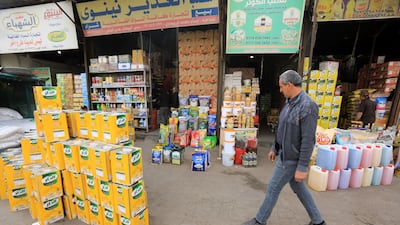Iraq’s economy is recovering well, with real gross domestic product expected to reach its pre-pandemic level this year, as Opec’s second-largest oil producer benefits from higher oil prices, according to International Monetary Fund estimates.
A boost in oil output is expected to push overall real GDP growth to 10 per cent in 2022, the IMF said in a statement on Friday at the conclusion of its staff level discussion with Iraqi officials.
The country’s real non-oil GDP expanded 20 per cent in 2021, buoyed by the resumption of economic activity, a more accommodative fiscal stance and stimulus measures by the country's central bank. It is poised to expand by another 5 per cent this year.
“The economic recovery is well underway,” Tokhir Mirzoev, the IMF official who led the Washington-based lender’s mission, said.
“The fiscal and current account balances are projected to post double-digit surpluses in per cent of GDP.”
Crude prices, which rose to a notch under $140 per barrel in mid-March after the US and its allies imposed sanctions on Moscow in response to its military offensive in Ukraine, have given up some gains but still remain elevated. Oil prices rallied 67 per cent in 2021 on robust demand as global economic momentum gathered pace last year.
Both Brent, the global benchmark for two-thirds of the world's oil, and West Texas Intermediate, the gauge that tracks US crude, were trading above $111 per barrel at 1.44pm UAE time.
Oil and gas-exporting economies in the Middle East are benefiting from higher energy prices and the IMF projects their growth at 5.4 per cent this year.
However, despite higher oil prices, consumer prices are on the rise in Iraq, with headline inflation in the county expected to climb to 6.9 per cent this year, driven in part by a rise in food prices.
While soaring oil revenues this year will more than offset the increased food and energy import bills, “cushioning the impact of surging food prices on the most vulnerable” remains an urgent priority, Mr Mirzoev said.
Iraq, like other oil exporters in the region, is trying to reform and diversify its economy. It is seeking “technical assistance and moral support” from the international community for its reform programme, Finance Minister Abdul-Amir Allawi said in April.
A white paper on economic reforms submitted to the parliament by Iraqi Prime Minister Mustafa Al Kadhimi's government in 2020 recommended the phasing out of subsidies in sectors considered critical to Iraq's economy, notably the power industry.
It also proposed slashing the bill for government salaries to 12.5 per cent of GDP within three years, from 25 per cent, as well as reforms to the pension system and a reduction in benefits and allowances.
“The current favourable oil market conditions also provide an opportunity to accelerate structural reforms envisaged in the authorities’ ‘White Paper’,” Mr Mirzoev said.
“Strengthening the quality of public services and creating the fiscal space for much-needed investments and the social safety net require a civil service reform, reducing inefficient energy subsidies, diversifying fiscal revenues and strengthening governance.”
Fixing the electricity sector will be crucial to reduce fiscal costs and boost private sector productivity. Improving the coverage and targeting of social assistance will also help protect the most vulnerable in the country, the IMF said.
In backdrop of elevated global risks, Iraq should shift the focus of macroeconomic policies to consolidating economic stability and strengthening Iraq’s long-term economic resilience, the fund said.
“In the short run, maintaining fiscal discipline and tapering the central bank’s lending support to the real estate sector will help avoid adding to inflationary pressures,” Mr Mirzoev said.
The country needs to build buffers for the future by saving a portion of oil revenues through a carefully designed sovereign wealth fund.
“There is no moment to lose … it’s important to use this windfall to accelerate and to foster an economic transformation that Iraq needs,” Jihad Azour, director of the Middle East and Central Asia Department at the IMF, said in April.
The country needs to maintain progress on two tracks: wisely using the resources that come with increasing oil prices but also making the necessary structural reforms for the medium term to diminish the impact of any volatility in oil prices, he said at the time.


